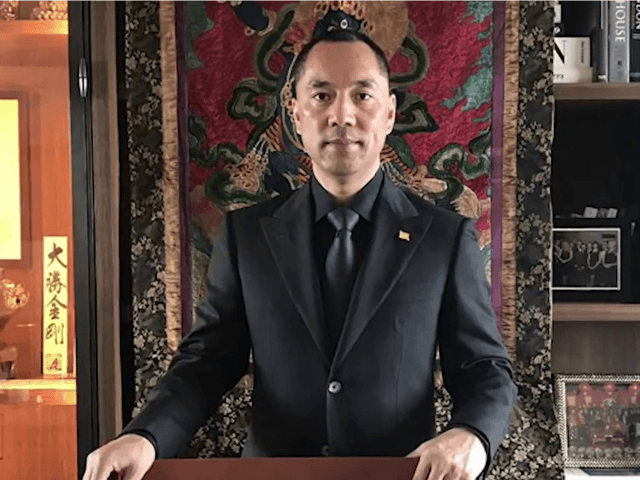Billionaire real estate mogul Guo Wengui is currently visiting the United States on a tourist visa, but he decided he would like to stay a little longer after top officials back in his homeland declared him an enemy of the Communist regime.
Guo applied for asylum in the United States this week, while the Chinese government has filed notices with Interpol seeking his arrest on charges of corruption and rape.
Guo earned the enmity of powerful officials back in his homeland by accusing them of extravagant corruption, including the top official on the Communist Party’s anti-corruption board, Wang Qishan.
50-year-old Guo has been working out of a $78 million penthouse in New York City for the past two years, flooding Twitter and YouTube with his allegations against Chinese officials. He often uses the name “Miles Kwok” on social media. Both his Facebook and Twitter accounts were mysteriously wiped out within a week of each other earlier this year, but eventually restored after he complained, and his followers began muttering about the willingness of social media giants to play ball with Chinese censors.
His videos and tweets include allegations of everything from “top leaders’ secret homes in California to their bank account information and hidden stakes in business empires,” according to the Associated Press. He has also accused the Chinese government of arresting his relatives to use as leverage against him.
He attempted to sell his apartment in July, but the deal was blocked by a Hong Kong hedge fund that argued he might move the cash from his liquidated asset outside the United States to evade his creditors.
“Some of the evidence he presents to back his claims is easily refuted or simply difficult to believe. But some of his accusations, such as those made against the family of Mr. Wang’s immediate predecessor, can be corroborated,” the New York Times observes.
Guo’s crusade does not appear to have weakened Wang’s position much, according to the Times, since Beijing has signaled he still enjoys “strong backing from his peers,” and some of them have taken pains to appear with Wang at ceremonial events such as the 100th anniversary commemoration of his father-in-law’s birth. Also, Wang is still secure in his anti-corruption seat well after the age when Chinese officials normally retire.
The counterattack from Chinese authorities and their state-run media has been fierce. The Associated Press kicks off its list of the charges against Guo with allegations that he sexually assaulted his 28-year-old personal assistant, then adds 19 more criminal complaints, including “bribing a top Chinese intelligence official, kidnapping, fraud and money laundering.”
The rape charge is exceptionally lurid, as the woman who filed the complaint charged Guo with assaulting her repeatedly in locations around the world over the course of two years while she traveled with him. She said she was occasionally held prisoner in Guo’s luxury accommodations, with her phone, computer, and passport confiscated.
Guo’s rags-to-riches story contains a good deal of the corruption he is crusading against, which an optimistic supporter might say qualifies him to know it when he sees it. In one colorful example provided by the Associated Press, Guo befriended an up-and-coming Chinese intelligence official named Ma Jian, who supplied him with a sex tape of a vice-mayor in Beijing who was blocking Guo’s bid for major project. Ma himself eventually became the top Chinese counterintelligence official, only to be accused of taking $8.8 million in bribes from Guo.
The AP notes that Chinese officials were extraordinarily eager to discuss the details of the ostensibly sensitive cases against Guo. The Chinese have discussed Guo’s case with senior U.S. officials and asked for his visa to be canceled—the strongest demand they could make, since the United States does not have an extradition treaty with China.
The New York Times points out a few hitches in Guo’s asylum application, beginning with the fact that it’s not entirely clear which country he is currently a citizen of. He has an impressive collection of passports, but the one nation he definitely lacks valid paperwork from is China. His lawyer said he doesn’t want to retire to any of the other nations he enjoy some form of citizenship from because he only feels safe from China in the United States. (His concerns about being kidnapped or killed by agents of Beijing are not unfounded; inconvenient Chinese billionaires have a habit of disappearing.)
Another problem is that granting Guo’s asylum request might interfere with the Trump administration’s efforts to secure Beijing’s assistance with North Korea. “Mr. Guo is arguably China’s most-wanted man, and giving him asylum would almost certainly antagonize Beijing, which may interpret the move as tacit approval of Mr. Guo’s tactics to undermine China’s leadership,” the New York Times speculates.
In the short term, that conflict might be avoided by allowing Guo to stay put while his asylum request is processed, which his lawyer noted could take years.
NPR reports that Guo met with Obama-era Homeland Security secretary Jeh Johnson a few months ago, in which Johnson evidently served as an unofficial emissary of the Trump administration. Leaked recordings of the meeting indicate Guo was told he would not be given to China as a bargaining chip. The recording also captured Guo taking pains to remind Johnson that he is a longtime member of President Trump’s Mar-a-Lago resort club.

COMMENTS
Please let us know if you're having issues with commenting.